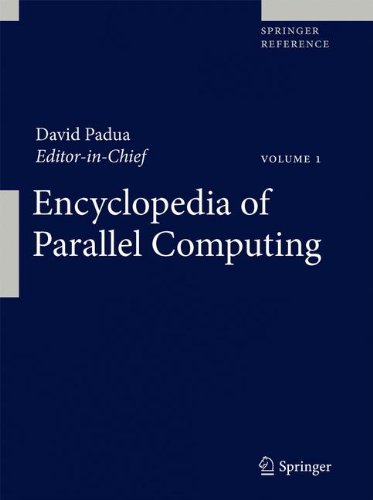

Most ebook files are in PDF format, so you can easily read them using various software such as Foxit Reader or directly on the Google Chrome browser.
Some ebook files are released by publishers in other formats such as .awz, .mobi, .epub, .fb2, etc. You may need to install specific software to read these formats on mobile/PC, such as Calibre.
Please read the tutorial at this link: https://ebookbell.com/faq
We offer FREE conversion to the popular formats you request; however, this may take some time. Therefore, right after payment, please email us, and we will try to provide the service as quickly as possible.
For some exceptional file formats or broken links (if any), please refrain from opening any disputes. Instead, email us first, and we will try to assist within a maximum of 6 hours.
EbookBell Team

4.0
66 reviewsContaining over 300 entries in an A-Z format, the Encyclopedia of Parallel Computing provides easy, intuitive access to relevant information for professionals and researchers seeking access to any aspect within the broad field of parallel computing. Topics for this comprehensive reference were selected, written, and peer-reviewed by an international pool of distinguished researchers in the field. The Encyclopedia is broad in scope, covering machine organization, programming languages, algorithms, and applications. Within each area, concepts, designs, and specific implementations are presented. The highly-structured essays in this work comprise synonyms, a definition and discussion of the topic, bibliographies, and links to related literature. Extensive cross-references to other entries within the Encyclopedia support efficient, user-friendly searchers for immediate access to useful information.
Key concepts presented in the Encyclopedia of Parallel Computing include; laws and metrics; specific numerical and non-numerical algorithms; asynchronous algorithms; libraries of subroutines; benchmark suites; applications; sequential consistency and cache coherency; machine classes such as clusters, shared-memory multiprocessors, special-purpose machines and dataflow machines; specific machines such as Cray supercomputers, IBM’s cell processor and Intel’s multicore machines; race detection and auto parallelization; parallel programming languages, synchronization primitives, collective operations, message passing libraries, checkpointing, and operating systems.
Topics covered: Speedup, Efficiency, Isoefficiency, Redundancy, Amdahls law, Computer Architecture Concepts, Parallel Machine Designs, Benmarks, Parallel Programming concepts & design, Algorithms, Parallel applications.
This authoritative reference will be published in two formats: print and online. The online edition features hyperlinks to cross-references and to additional significant research.
Related Subjects: supercomputing, high-performance computing, distributed computing